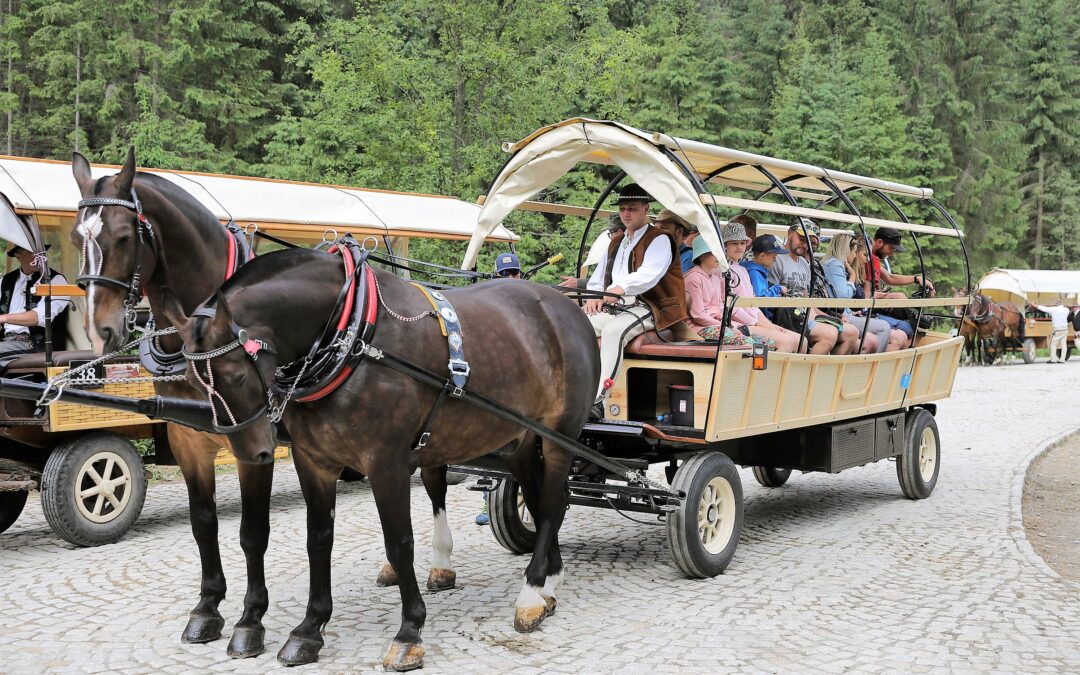A hybrid horse cart is being tested in a Polish mountain park, using a self-charging electric battery to assist the animals during tough uphill climbs.
The Tatra National Park, a reserve in the mountainous south of Poland, is a popular tourist destination. Many visitors head to the Morskie Oko, the largest lake in the Tatras, nestled amid stunning views between the mountains.
While it is possible to access the lake by a two-hour trek, some visitors travel on horse-drawn carriages. But the practice has long stirred controversy over claims of mistreatment and overworking of the animals.

Morskie Oko lake in Poland’s Tatra mountains (Aneta Pawska/Wikimedia Commons, under CC BY 3.0)
Now the park has introduced a new hybrid cart, which works in similar fashion to an electric-assist bicycle. The horses are helped by a battery-powered motor as they walk uphill, and up to 95% of energy is recharged on the way down. The engine adjusts to the pace of the horses to avoid sudden jolts.
The prototype was launched in late June and regular service began in July. Szymon Ziobrowski, director of the park, said that “everyone is satisfied” with the solution and there had so far been “no serious faults”, reports TVP Info. Veterinarians have been monitoring the welfare of the horses.
“Our observations show that it is much easier on the horses,” adds Stanisław Chowaniec, who is in charge of the local cart drivers. “We need to finish testing, but if it is necessary to change the carts [to hybrid ones], the drivers are in favour of it.”
Poland's government is seeking to introduce retirement benefits for dogs and horses that have served in the police.
Currently, they receive no state support after finishing work, and are cared for by their former handler or a charity https://t.co/SsJ6UxtO8g
— Notes from Poland 🇵🇱 (@notesfrompoland) February 20, 2021
The additional mechanisms make the hybrid cart longer and 500 kg heavier than a regular one. From the outside, however, it looks similar to the traditional model.
The vehicle used in the park was built in-house at a cost of 120,000 zloty (€26,000). But, if the solution is adopted more widely, production will be outsourced at a lower cost. A decision will be reached at the end of the peak summer season.
The use of horse-drawn carts at Morskie Oko has long aroused criticism from animal rights groups. A number of cases of horses collapsing in the heat have been reported. Last year, in the first ruling of its kind, two cart drivers were convicted of animal abuse
Excellent protest action by an animal rights organisation – placing a sculpture of a collapsed horse on the path to Morskie Oko, where overworked horses frequently collapse while pulling tourists up a 9km-long incline. https://t.co/hxgF0pRUUo
— Ben Stanley (@BDStanley) August 20, 2019
Ziobrowski admits that the introduction of hybrid carts is intended to resolve such issue. “We want to apply the latest technologies to finally solve this problem,” Ziobrowski told Gazeta Wyborcza.
However, one animal rights group, Viva!, has already raised concern about the new carts, noting that horses now have to pull a vehicle that is half a tonne heavier. They also worry about what would happen if the device caught fire while a horse was fastened to the cart.
“The only way to end the suffering of the horses is to eliminate this [form] of transport,” Anna Zielińska from Viva! told Gazeta Krakowska.
Main image credit: Marek Podmokly / Agencja Gazeta

Maria Wilczek is deputy editor of Notes from Poland. She is a regular writer for The Times, The Economist and Al Jazeera English, and has also featured in Foreign Policy, Politico Europe, The Spectator and Gazeta Wyborcza.




















